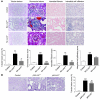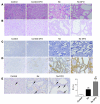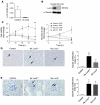Lipocalin 2 is essential for chronic kidney disease progression in mice and humans
- PMID: 20921623
- PMCID: PMC2964970
- DOI: 10.1172/JCI42004
Lipocalin 2 is essential for chronic kidney disease progression in mice and humans
Abstract
Mechanisms of progression of chronic kidney disease (CKD), a major health care burden, are poorly understood. EGFR stimulates CKD progression, but the molecular networks that mediate its biological effects remain unknown. We recently showed that the severity of renal lesions after nephron reduction varied substantially among mouse strains and required activation of EGFR. Here, we utilized two mouse strains that react differently to nephron reduction--FVB/N mice, which develop severe renal lesions, and B6D2F1 mice, which are resistant to early deterioration--coupled with genome-wide expression to elucidate the molecular nature of CKD progression. Our results showed that lipocalin 2 (Lcn2, also known as neutrophil gelatinase-associated lipocalin [NGAL]), the most highly upregulated gene in the FVB/N strain, was not simply a marker of renal lesions, but an active player in disease progression. In fact, the severity of renal lesions was dramatically reduced in Lcn2-/- mice. We discovered that Lcn2 expression increased upon EGFR activation and that Lcn2 mediated its mitogenic effect during renal deterioration. EGFR inhibition prevented Lcn2 upregulation and lesion development in mice expressing a dominant negative EGFR isoform, and hypoxia-inducible factor 1α (Hif-1α) was crucially required for EGFR-induced Lcn2 overexpression. Consistent with this, cell proliferation was dramatically reduced in Lcn2-/- mice. These data are relevant to human CKD, as we found that LCN2 was increased particularly in patients who rapidly progressed to end-stage renal failure. Together our results uncover what we believe to be a novel function for Lcn2 and a critical pathway leading to progressive renal failure and cystogenesis.
Figures









References
-
- Meguid El Nahas A, Bello AK. Chronic kidney disease: the global challenge. Lancet. 2005;365(9456):331–340. - PubMed
-
- Kidney and Urologic Diseases Statistics for the United States. National Kidney and Urologic Diseases Information Clearinghouse (NKUDIC) Web Site. http://kidney.niddk.nih.gov/kudiseases/pubs/kustats/index.htm . Accessed August 10, 2010.
-
- Terzi F, et al. Subtotal but not unilateral nephrectomy induces hyperplasia and protooncogene expression. Am J Physiol. 1995;268(5 pt 2):F793–F801. - PubMed
Publication types
MeSH terms
Substances
LinkOut - more resources
Full Text Sources
Other Literature Sources
Medical
Molecular Biology Databases
Research Materials
Miscellaneous

